bee-mimic robber flies
(Laphria canis complex)
Conservation • Description • Habitat • Ecology • Distribution • Taxonomy
|
|
||||||||||||||
Description |
Laphria canis complex is an artificial grouping of at least six closely related species of small to medium-sized bee-mimic robber flies. One species occurs only in the far west. Two species are undescribed. The remaining three species have been collected in Minnesota (University of Minnesota Entomology Collection). The western species is also in that collection, but it is so far out of its known range that the identification must be questioned. Males of the species can be differentiated by the size of the genital bulb or by close examination of the genitalia. Females cannot be differentiated from a photograph. Laphria canis complex occurs in the United States and southern Canada east of the Great Plains. In Minnesota it is most common in the southeast quarter of the state, where it is at the western extent of its range. It is found from June through August in shaded woodlands, woodland openings and edges, and fields near woodlands. Adults perch on the leaves of low plants. Larvae live in soil or rotting wood, where they prey on the larvae of other insects. Adults are black, slender, and small, usually ¼″ to ½″ (7 to 12 mm) in length but sometimes up to ⅝″ (16 mm) long. The thorax and abdomen are thinly covered with pale grayish hairs. There are two large compound eyes on the side of the head and three small simple eyes (ocelli) in a triangle on top of the head. The top of the head is depressed (“hollowed out”) between the compound eyes. The ocelli are on a prominent rounded projection (tubercle) in the middle of the head between the compound eyes. There is a prominent mustache of long, stiff, black bristles (mystax) on the immediately above the mouth. The hairs on the sides of the head and below the mouth (beard) are silvery. The antennae have 3 segments. The third segment is elongated. The thorax is black. Depending on the angle of the light it may appear slightly golden. The small, knob-like structures on each side of the thorax (halteres) are yellow. The abdomen is long, slender, tapered, and black. The genital bulb at the tip of the abdomen is black. On Laphria canis it is much larger than the adjacent abdominal segment. The wings are clear. They are pale at the base, moderately to barely smoky brown beyond. The legs are stout and black. They are covered with long gray and black hairs. The last part of the leg (tarsus), corresponding to the foot, has five segments. The last segment has 2 pads. |
Size |
Total length: ¼″ to ⅝″ (7 to 16 mm) |
Similar Species |
Habitat |
Shaded woodlands, woodland openings and edges, and fields near woodlands |
Ecology |
Season |
Late May through August |
Behavior |
|
Life Cycle |
|
Larva Food |
Insect larvae |
Adult Food |
Small invertebrates |
Distribution |
||
|
Sources |
|
| 9/19/2024 | ||
Occurrence |
||
|
||
Taxonomy |
|
Order |
|
Suborder |
Brachycera |
Infraorder |
Orthorrhapha |
Superfamily |
Asiloidea |
Family |
|
Subfamily |
Laphriinae |
Tribe |
Laphriini |
Genus |
|
Subordinate Taxa |
|
common black laphria (Laphria canis) dagger laphria (Laphria sicula) western black laphria (Laphria franciscana) Winnemana laphria (Laphria winnemana) |
|
Synonyms |
|
Laphria dispar Laphria disparella |
|
Common Names |
|
|
|
Glossary
Halteres
In flies: a pair of knob-like structures on the thorax representing hind wings that are used for balance.
Mystax
On flies, especially in the family Asilidae, a patch of bristles or hairs (mustache) immediately above the mouth.
Ocellus
Simple eye; an eye with a single lens. Plural: ocelli.
Tarsus
On insects, the last two to five subdivisions of the leg, attached to the tibia; the foot. On spiders, the last segment of the leg. Plural: tarsi.
Visitor Photos |
||
Share your photo of this insect. |
||
This button not working for you? |
||
Alfredo Colon |
||
 |
 |
|
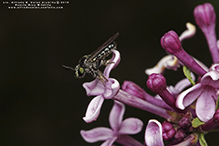 |
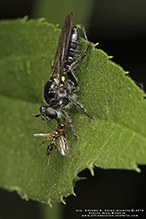 |
|
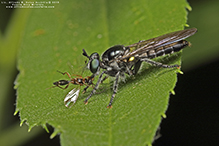 |
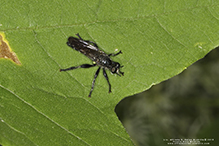 |
|
Babette Kis |
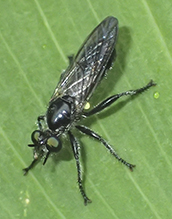 |
Laphria canis complex bee like robberfly The attached photo, taken on June 28, 2021 at Barnes Prairie hedgerow, Racine Co., WI is of a Laphria canis complex, bee-mimic robberfly, on a Solomon's seal leaf. |
MinnesotaSeasons.com Photos |
||
|
||
|
||

Slideshows |
|

Visitor Videos |
||
Share your video of this insect. |
||
This button not working for you? |
||
|
Other Videos |
||
Robber Fly (Asilidae: Laphria canis) Anterior view |
About
Jun 23, 2010 Photographed at Turtle River State Park, North Dakota (22 June 2010). |

Visitor Sightings |
||
Report a sighting of this insect. |
||
This button not working for you? |
||
Alfredo Colon |
Location: Albany, NY |
 |
| Alfredo Colon 8/22/2019 |
Location: Woodbury, MN |
 |
| Alfredo Colon 8/6/2019 |
Location: Woodbury, MN |
 |
| Alfredo Colon 8/2/2019 |
Location: Woodbury, MN |
 |
MinnesotaSeasons.com Sightings |
||
|

Created: 2/2/2021 Last Updated: © MinnesotaSeasons.com. All rights reserved. |

